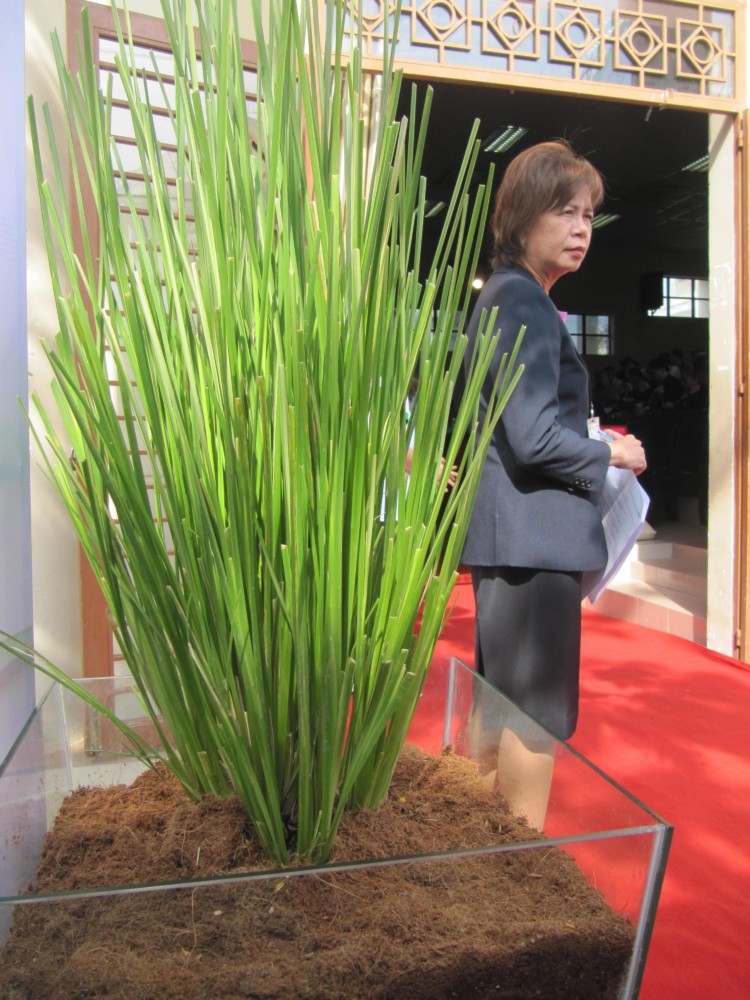By Cong Thanh
Vietnam News, Hanoi / Asia News Network
WWR Article Summary (tl;dr) Vietnamese entrepreneur Do Le Kim Hue has launched the “Green Belt Technology and Environment Company”, which makes organic cosmetics using local essential oils and available natural ingredients.
Vietnam News, Hanoi / Asia News Network
Alarmed about unsafe food and chemical contamination from many sources, Vietnamese consumers are favoring organic products like home-grown vegetables, handmade natural craftwork and cosmetics that do not use chemicals.
In recent years, several dozen start-ups in the central city of Da Nang have begun to tap into the growing demand for healthy lifestyle products.
One such entrepreneur is Do Le Kim Hue.
Hue, 33, has launched the Green Belt Technology and Environment Company, which makes organic cosmetics using local essential oils and available natural ingredients.
“It’s not a new business in the world, but it has just started booming in Viet Nam. Local consumers now are aware of safety and quality of daily use products, and this is their main focus rather than price,” Hue said.
“Vietnamese users are cautious now, and prefer to have trusted brands and chemical-free ingredients in every product. They are scared of cancer (and other diseases) that can result from contaminated food and beauty care products.
“Modern technology has been used in natural essential oil production in many developed countries, but it’s still a novel concept in Viet Nam.”
Hue, her husband, Dang Duc Long, who has a PhD in bio-chemistry, and their partners have successfully developed natural body lotions, soaps, insect repellents and lip balm from essential oils in combination with beeswax, herbal colours and scents.
“We use only local ingredients and qualified essential oil suppliers. So we carry the nature scent of Viet Nam and are proud of using local material.”
Hue, who is CEO and founder of the company, said their organic cosmetics carry the Arya Tara brand (named after a famed Champa beauty when the Champa Kingdom ruled the central region between the 4th and 13th centuries).”
Long, who works with the Viet Nam-UK Institute for Research & Executive Education in Da Nang, said: “Arya Tara brand came out after three years of research. Almost everything it uses is local: coconut oil from Binh Dinh and Ben Tre; ginseng, cinnamon and cajuput oil from Quang Nam, Thua Thien-Hue and Dong Nai.”
He said natural oils comprised between 70 to 80 per cent of the product, extracts of beewax, aloe vera and turmeric extract accounted for the remaining ingredients.
Tourism gifts
Nguyen Thi Thuy Mai, deputy director of Da Nang’s Industry and Trade department, said Arya Tara cosmetic products have been chosen in the “typical souvenirs of Da Nang” list for 2017, when the city hosts an APEC summit.
“We had a strict selection process to choose various products that could exhibit the image of Da Nang among visitors. We highly appreciate the natural, original ingredients and environment-friendly technology of the Arya Tara brand,” Mai said.
“Da Nang is known mostly for its stone sculpture and the Ngu Hanh Son (Marble Mountains), but we want to create different images and offer different choices for tourists visiting Da Nang,” she said.
She said the city will would provide “top support” for the start-up through promotion programmes nationwide and abroad.
Le Que, an essential oil supplier, said he has had been producing essential oil from herb farms in Viet Nam for years.
“Aromatic herbs are abundant in Viet Nam. We extract pure oils through distillation and supply them for making medicine and beauty products.
“Our essential oil is a major raw material for cosmetics, medicines and detergents. The production requires a strict process and selection, and the use of non-chemical fertilizers and pesticides,” he said.
He said the essential oil industry has had very good potential in Viet Nam, and local herb growers could join the value chain of organic production for sustainable hi-tech farm development.
Vetiver grass oil
Tran Minh Thao, a lecturer at the Da Nang Technology College, has used vetiver (Vetiveria Zizanioides) grass for a sewage treatment project in the city, but even after it closed, he continued testing with essential oil extract from vetiver roots.
Thao said the essential oil from this grass is a fragrancy stabilizing factor in organic cosmetics.
“It (vetiver essential oil) is a very small part of cosmetics (1 or 2 per cent), but 100ml of vetiver essential oil can be sold at VND5 or VND6 million (US$220 or $260),” Thao said.
“Local farmers could earn a stable income from growing the grass if they join a value chain of natural essential oils production. A bunch of vetiver grass root can be used for essential oil extraction after a six-month growth period,” Thao said.
“I have been using the root in wastewater treatment, before releasing them for essential oil production at the cheapest cost,” he said.
He speculated that a stable market for organic cosmetics will open the path to mass farming of vetiver grass.
Vetiver is now grown at a 5ha farm of the Da Nang-based Viet Nam Vetiver Network, which provides the grass for preventing erosion on earthen roadside slopes in the country.
Thao said Vietnamese natural oil cosmetics, functional food, massage oils and healthcare products are now popular in Europe, so there is a lot of potential for growing essential oil plants in poverty-stricken rural and mountainous areas.
Hue’s company plans to produce 5,000 to 10,000 organic cosmetic products each month.
“Each Arya Tara brand product carries Da Nang’s symbol and tourists can recognise that it’s a made-in Da Nang gift. So it will also helps promote tourism,” Hue said.
“Stone sculptures or wooden craftworks are quite heavy to pack. Organic perfume bottles, natural flower-scented hand-sanitizer, turmeric or cocoa soap and body lotion are easily portable,” she said.
Hue also said that the image of Red-Shanked Doucs (Pygathrix nemaeus), an endangered primate in Da Nang’s Son Tra Nature Reserve, can be used on Arya Tara products for the 2017 APEC summit.














































































































































































































































































































































































